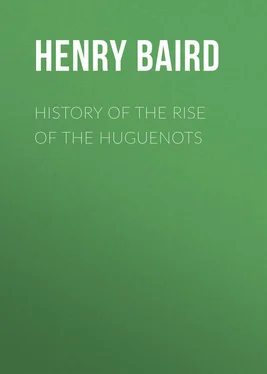Henry Baird - History of the Rise of the Huguenots
Здесь есть возможность читать онлайн «Henry Baird - History of the Rise of the Huguenots» — ознакомительный отрывок электронной книги совершенно бесплатно, а после прочтения отрывка купить полную версию. В некоторых случаях можно слушать аудио, скачать через торрент в формате fb2 и присутствует краткое содержание. ISBN: , Жанр: foreign_antique, foreign_prose, на английском языке. Описание произведения, (предисловие) а так же отзывы посетителей доступны на портале библиотеки ЛибКат.
- Название:History of the Rise of the Huguenots
- Автор:
- Жанр:
- Год:неизвестен
- ISBN:http://www.gutenberg.org/ebooks/30708
- Рейтинг книги:4 / 5. Голосов: 1
-
Избранное:Добавить в избранное
- Отзывы:
-
Ваша оценка:
- 80
- 1
- 2
- 3
- 4
- 5
History of the Rise of the Huguenots: краткое содержание, описание и аннотация
Предлагаем к чтению аннотацию, описание, краткое содержание или предисловие (зависит от того, что написал сам автор книги «History of the Rise of the Huguenots»). Если вы не нашли необходимую информацию о книге — напишите в комментариях, мы постараемся отыскать её.
History of the Rise of the Huguenots — читать онлайн ознакомительный отрывок
Ниже представлен текст книги, разбитый по страницам. Система сохранения места последней прочитанной страницы, позволяет с удобством читать онлайн бесплатно книгу «History of the Rise of the Huguenots», без необходимости каждый раз заново искать на чём Вы остановились. Поставьте закладку, и сможете в любой момент перейти на страницу, на которой закончили чтение.
Интервал:
Закладка:
103
And yet I agree with Von Polenz, Gesch. des Franz. Calvinismus (Gotha, 1859), ii. 188, 189, note, in regarding the Roman Catholic accounts of Des Adrets's cruelties and perfidy as very much exaggerated, and in insisting upon the circumstance that the barbarity practised at Orange had furnished him not only the example, but the incentive.
104
According to Jean de Serres, this leader was the Baron des Adrets in person; according to De Thou, Montbrun commanded by the baron's appointment. So also Histoire ecclés., iii. 171.
105
So at Montbrison, the Baron des Adrets reserved thirty prisoners from the common slaughter to expiate the massacre of Orange by a similar method. One of them was observed by Des Adrets to draw back twice before taking the fatal leap. "What!" said the chief, "do you take two springs to do it?" "I will give you ten to do it!" the witty soldier replied; and the laugh he evoked from those grim lips saved his life. De Thou (iii. 231, 232) and others.
106
J. de Serres, ii. 188; Castelnau, liv., iv. c. ii. But the "Discours des Guerres de la comté de Venayscin et de la Prouence … par le seigneur Loys de Perussiis, escuyer de Coumons, subiect uassal de sa saincteté" (dedicated to "Fr. Fabrice de Serbellon, cousin-germain de N. S. P. et son général en la cité d'Avignon et dicte comté,") Avignon, 1563, and reprinted in Cimber (iv. 401, etc.), makes no mention of the fig-tree, and regards the preservation as almost miraculous. There is a faithful representation of the ruined Château of Mornas above the frightful precipice, in Count Alexander de Laborde's magnificent work, Les Monuments de la France (Paris, 1836), plate 179.
107
Discours des Guerres de la comté de Venayscin, etc., 453; De Thou, iii. 240.
108
Mém. de Blaise de Montluc, iii. 393 (Petitot ed.): "pouvant dire avec la vérité qu'il n'y a lieutenant de Roy en France qui ait plus faict passer d'Huguenots par le cousteau ou par la corde, que moy."
109
"Me deliberay d'user de toutes les cruautez que je pourrois." Ib., iii. 20. "Je recouvray secrettement deux bourreaux, lesquels on appella depuis mes laquais, parce qu'ils estoient souvent après moy." Ib., iii., 21. Consult the succeeding pages for an account of Montluc's brutality, which could scarcely be credited, but that Montluc himself vouches for it.
110
Since the publication of the Edict of January at Toulouse (on the 6th of February), the Protestant minister had sworn to observe its provisions before the seneschal, viguier, and capitouls, and, when he preached, these last had been present to prevent disturbance. A place of worship, twenty-four cannes long by sixteen in width (174 feet by 116), had been built on the spot assigned by the authorities. Hist. ecclés. des égl. réf., iii. 1.
111
De Thou, iii. 294; Hist. ecclés. des égl. réf., iii. 1-32.
112
Even in 1762, Voltaire remonstrated against a jubilee to "thank God for four thousand murders." Yet a century later, in 1862, Monseigneur Desprez, Archbishop of Toulouse, gave notice of the recurrence of the celebration in these words: "The Catholic Church always makes it a duty to recall, in the succession of ages, the most remarkable events of its history – particularly those which belong to it in a special manner. It is thus that we are going to celebrate this year the jubilee commemorative of a glorious act accomplished among you three hundred years ago." The archbishop was warm in his admiration of the last centennial procession, "at which were present all the persons of distinction – the religious orders, the officiating minister under his canopy, the red robes, and the members of parliament pressing behind the university, the seneschal, the bourgeoisie , and finally a company of soldiers." But the French government, not agreeing with the prelate in the propriety of perpetuating the reminiscence, forbade the procession and all out-door solemnities, and declared "the celebration of a jubilee of the 16th to the 23d of May next, enjoined by the Archbishop of Toulouse, to be nothing less than the commemoration of a mournful and bloody episode of our ancient religious discords." See a letter from a correspondent of the New York Evening Post, Paris, April 10, 1862.
113
Papal brief of April 23, 1562: "Ista sunt vere catholico viro digna opera, ista haud dubie divina sunt beneficia. Agimus omnipotenti Deo gratias, qui tam præclaram tibi mentem dedit," etc. Soldan, ii. 61.
114
De Thou, iii. 149-151.
115
Ibid., iii. 143, April 7th.
116
Catharine de' Medici stated to Sir Harry Sydney, the special English envoy, in May, 1562, that her son-in-law, the King of Spain, had offered Charles thirty thousand foot and six thousand horse "payd of his owne charge," besides what the Duke of Savoy and others were ready to furnish. Letter of Sidney and Throkmorton to Queen Elizabeth, May 8, 1562, MSS. State Paper Office. Duc d'Aumale, Princes de Condé, Pièces justif., i. 363.
117
Sir T. Chaloner, ambassador in Spain, to Sir Nicholas Throkmorton, May 1, 1562, Haynes, State Papers, 382, 383.
118
April 17th. Mém. de Condé, iii. 281-284.
119
May 15th and 16th, Mém. de Condé, iii. 284-287.
120
Froude, History of England, vii. 404.
121
Throkmorton to the queen, April 1, 1562, State Paper Office.
122
Cecil to Mundt, March 22, 1562, State Paper Office.
123
Wm. Hawes to Throkmorton, July 15, 1562, State Paper Office.
124
Hist. ecclés., iii. 143-145; De Thou, iii. 233, 234.
125
Almost all the members of Condé's council favored a call upon the German Protestant princes for prompt support. But "the admiral broke off this plan of theirs, saying that he would prefer to die rather than consent that those of the religion should be the first to bring foreign troops into France." It was, therefore, concluded to send two gentlemen to Germany, to remain there until the conclusion of the war, in order to explain the position of the Huguenots. Hist. ecclés. des égl. réf., ii. 23.
126
Mém. de Condé, i. 79, 80. Cf. Baum, ii., App., 177.
127
Hist. ecclés. des égl. réf., ii. 14; Mém. de Condé, i. 81-83, and iii. 256; De Thou, iii. 143.
128
"Que sans sa venue à Paris, il fust arrivé vers les Pasques, plus de quinze centz chevaulx de tous costez du royaume, pour saccager la ville," etc. Response à la Déclaration que faict le Prince de Condé, etc. Mém. de Condé, iii. 242.
129
Mém. de Condé, iii. 388-391; Hist, ecclés. des égl. réf., ii. 30, 31; Jean de Serres, ii. 63; De Thou, iii. 152.
130
J. de Serres, ii. 112-117; Hist. ecclés. des égl. réf., ii. 27-29; Mém. de Condé, iii. 392, 393; De Thou, iii. 153, 154.
131
Jean de Serres, ii. 118-150; Mém. de Condé, iii. 395-416; Hist. ecclés. des égl. réf., ii. 32-46; De Thou, iii. 154-157. It is incredible that, as De Thou suggests, this answer should have been penned by Montluc, Bishop of Valence. On the other hand, it bears every mark of having proceeded from the pen of that learned, eloquent, and sprightly writer, Theodore Beza. As a literary production it fully deserves the warm encomium passed upon it by Professor Baum: "It is a masterpiece in respect both to the arrangement and to the treatment of the matter; and, with its truly Demosthenian strength, may, with confidence, be placed by the side of the most eloquent passages to which the French language can point." Baum, Theodor Beza, ii. 642.
Читать дальшеИнтервал:
Закладка:
Похожие книги на «History of the Rise of the Huguenots»
Представляем Вашему вниманию похожие книги на «History of the Rise of the Huguenots» списком для выбора. Мы отобрали схожую по названию и смыслу литературу в надежде предоставить читателям больше вариантов отыскать новые, интересные, ещё непрочитанные произведения.
Обсуждение, отзывы о книге «History of the Rise of the Huguenots» и просто собственные мнения читателей. Оставьте ваши комментарии, напишите, что Вы думаете о произведении, его смысле или главных героях. Укажите что конкретно понравилось, а что нет, и почему Вы так считаете.












